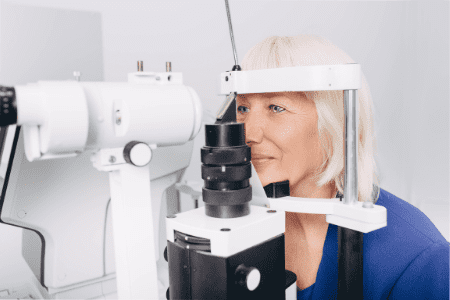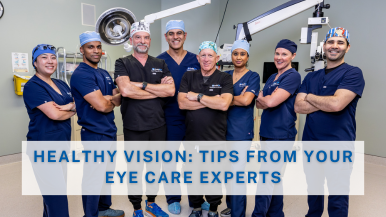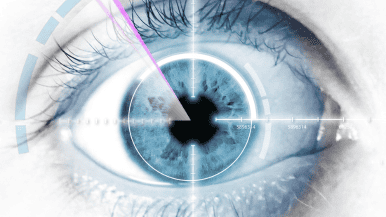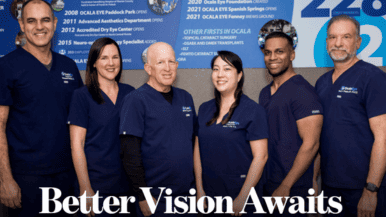- What are cataracts and how do they affect your vision?
- How do you know if you have cataracts?
- What causes cataracts?
- What is the treatment for cataracts?
- What’s recovery like after advanced cataract surgery?
Before Tom H. underwent advanced cataract eye surgery at Ocala Eye, he struggled with worsening vision. He says, “It’s really terrible when you go down the road and you have to get 100 feet away from a stop light to be able to see whether it’s green or red.”
Tom is talking about the gradual dimming of the world that comes with the eye disease known as cataracts. Over time, the cataracts gradually cut off your vision, and without treatment, can lead to blindness. Here’s everything you should know about cataracts and the surgery to correct the condition, as told through the eyes of Tom, another satisfied Ocala Eye patient.
What Are Cataracts and How Do They Affect Your Vision?
Aging affects your entire body, including your eyes. As we get older, the proteins in the clear lenses at the front of your eyes break down. This gradually clouds the lens of the eye with a film, which is really the buildup of the protein material.
Imagine looking through a windshield with a hazy screen over the glass. That’s what happens when you develop cataracts, which gradually block the light from entering the eye, causing you to lose some of your eyesight.
The problem is that cataracts are a degenerative condition that can negatively affect everything you do, from trying to read to looking at a computer screen to driving at night.
How Do You Know if You Have Cataracts?
At first, cataract formation causes almost no symptoms. Because the condition gradually worsens, your vision can be seriously impaired before you recognize the signs of a cataract. However, if you make it a habit to visit your eye doctor each year for preventative healthcare, your doctor will alert you early on that the cataracts are forming.
Some of the symptoms of cataracts include:
- Blurred vision
- Difficulty seeing at night
- Double vision
- Having light sensitivity
- Your glasses or contacts aren’t working properly


In addition to these symptoms, you’ll notice that bright colors will fade or yellow over time. You also will likely struggle with reading and will require increasing light beside you to see the words on the page.
This gradual process can have a negative effect on the quality of your life. Tom was very aware of the changes cataracts were bringing to his life. He says, “My eyes were so bad that it was just wonderful to go through the surgery and everything.”
What Causes Cataracts to Form?
The natural aging process is the top cause of cataracts, and chances are high that the proteins in your eyes will just naturally start to break down as you get older. Although people over age 60 usually start to have some clouding of their lenses, vision problems may not happen until years later.
Some of the other causes of cataracts in your eyes can include:
- A family history of cataracts
- Diabetes or other medical problems
- Having an eye injury
- Having prior eye surgery
- Smoking
- Spending too much time in the sun without UV protection sunglasses
- Using corticosteroids regularly
Wearing sunglasses or stopping smoking may help slow down the progression of this disease. Ultimately, though, you may need to see your doctor to have the cataracts removed.
What Is the Treatment for Cataracts?
 Surgery is the only treatment for cataracts. However, if you’re seeing your eye doctor regularly a stronger prescription for your glasses or contacts may delay the inevitable surgery recommendation. However, cataract surgery, if you’ve been diagnosed with the condition, will eventually happen.
Surgery is the only treatment for cataracts. However, if you’re seeing your eye doctor regularly a stronger prescription for your glasses or contacts may delay the inevitable surgery recommendation. However, cataract surgery, if you’ve been diagnosed with the condition, will eventually happen.
Tom, though, was pleasantly surprised. He says, “I enjoyed having the surgery done. I mean, I was scared at first, but when I went through the first time, there was nothing to it.”
Most people experience cataracts in both eyes. In these cases, your doctor will usually do surgery to replace the lens on one eye then allow that to heal. Then you’ll revisit the facility to have surgery on the other eye.
During cataract surgery, your doctor will remove the cloudy eye lens and replace it with a new artificial lens. This is a very common, safe, 20-minute procedure done in your ophthalmologist’s office. You don’t even have to enter a hospital. Even better, more than 95% say they can see better after cataract surgery.
What’s Recovery Like After Advanced Cataract Surgery?
Recovery from advanced cataract surgery goes smoothly for most people. Tom says, “Dr. Ahmed was my surgeon for my eyes and I’m thrilled (with the result).”
After the surgery, your eyes may feel itchy or uncomfortable. Your doctor will send you home with eye drops and other medications to make you comfortable as you heal. You may have a patch or bandage over your eye to help remind you not to rub it and cause harm to the surgical site.
Most people see better anywhere from one to three days after the procedure, but full healing and better vision comes gradually over one to two months. According to Tom, advanced cataract surgery was a pretty easy fix for such a serious problem. He says, “It was great. I was very, very happy with the work they did here.”
Tom describes the surgery as “easy,” and he has this advice for anyone experiencing cataract symptoms: “If you have a problem with your eyesight and your vision is very weak, not very strong, and you can’t see too well then what you need to do is schedule an appointment with Ocala Eye. They’re wonderful people, great doctors, and the techs are just fantastic.”




